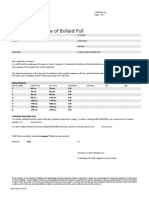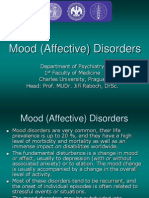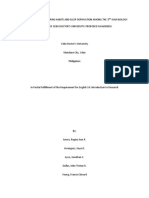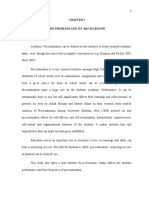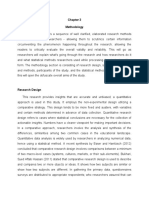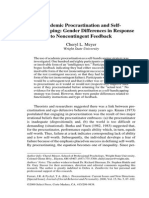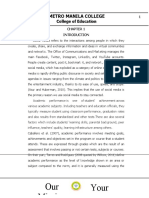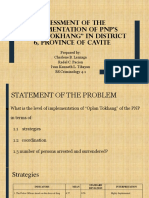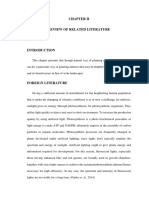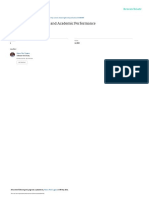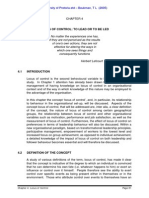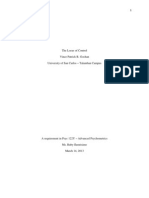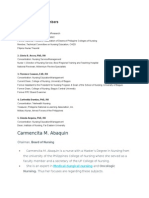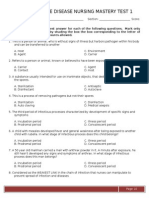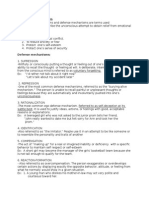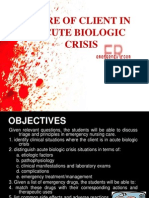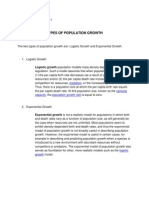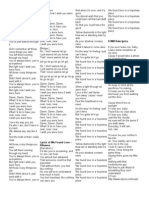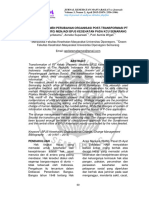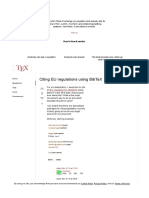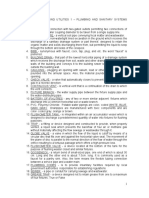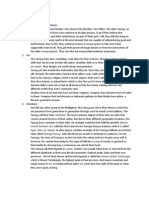Chapter 1
Chapter 1
Uploaded by
Don MarcusCopyright:
Available Formats
Chapter 1
Chapter 1
Uploaded by
Don MarcusCopyright
Available Formats
Share this document
Did you find this document useful?
Is this content inappropriate?
Copyright:
Available Formats
Chapter 1
Chapter 1
Uploaded by
Don MarcusCopyright:
Available Formats
2
Dodong not his real name, a second year Radiologic Technology student of Cebu Doctors University believed that his good grades in his assignments are a result of good luck. In addition to this, he also believes that the assignment is easy to comply with and there is no reason that one will get poor grades to that assignment. He also believed that his poor grade in his last long exam is due to the fact that the exam was constructed with difficulty. Dodong obviously attributed outcomes of events to external circumstances. He relies on luck and expects less that his efforts will result in success and therefore is less likely to work hard for high grades. Because of Dodongs beliefs, he often delayed some of his academic tasks such as assignments, requirements or projects by starting them late just before the deadline. At the other extreme, people attribute outcomes of events to internal circumstances such as effort and ability that is internal locus of control. Like Ronnel another second year Radiologic Technology student who believed that his scores on exams depend on his efforts. Unlike Dodong he does not rely on luck and external circumstances. . Because he believes on effort, rather than lucks, he started most of his assignments on time and performed well in the class. He insisted that it is always better to start an assignment earlier because it made him not to worry. He added that he can still make corrections to his work and improve it more. But he admitted that he also delays or postpones some of his academic tasks. One of his reasons is because he found it uninteresting. From the situations cited above, the researchers then asked: what is the locus of control of the students? What areas of academic procrastination do students procrastinate? What reasons do they have to procrastinate? What could be the
differences in the students locus of control, areas and reasons of academic procrastination? Knowledge on the findings of this study will be of great contribution to the personal inquiry of the researchers. Furthermore, the study would be a stepping stone for a deeper investigation on locus of control and academic procrastination among the learners. Theoretical Background In 1964, Julian B. Rotter developed a concept on Locus of control as the extent to which individuals believe that they can control events that affect them. It is also the extent to which people perceive outcomes as internally controllable by their own effort and actions or as externally controlled by chance or outside forces. People have a generalized expectancy about the extent to which they control the rewards, punishment and, in general, the events that occur in their lives. Rotter called this generalized expectancy, Locus of control. (Myers 55) Locus of control could be internal and external locus of control. Individuals with a high internal locus of control believe that events result primarily from their own behaviour and actions. Those with a high external locus of control believe that powerful others, fate, or chance primarily determine events. Those who see themselves as internally controlled are more likely to do well in school, successfully stop smoking, drinking, and other distractions in order to achieve long-term goals. (Myers 55) Locus of control orientation is a continuum between internal and external ownership of identified factors that lead to a particular outcome; it is influenced by environmental, cultural, and personal variables (Rotter, 1966). An individual with a predominately
internal locus of control orientation attributes personal success or failure to his or her own efforts and abilities, which include thoughts, behaviors, motivations, and aptitudes. (Spector, 1983). An internal locus of control orientation is more conducive to high achievement, social adjustment, and independent functioning, but has been positively correlated with resistance to submit to authority and reduced sympathy for others.An individual with a predominately external locus of control orientation believes that outcomes are related more too extenuating circumstances beyond personal control such as luck, fate, the will of other people, or the influence of greater external forces such as God or nature (Rotter, 1966, 1982). Individuals with stronger external locus of control orientations are more likely to be vulnerable to external manipulation, but they are also more likely to conform to imposed norms and social expectations (Spector, 1983). Locus of control refers to an individual's generalized expectations concerning where control over subsequent events resides. In other words, who or what is responsible for what happens. It is analogous to, but distinct from, attributions. According to Weiner the "attribution theory assumes that people try to determine why people do what they do, i.e., attribute causes to behavior." The theory assumes that there are two causes in explaining behaviour, the situational cause and the dispositional cause. The situational cause is a perceived cause of behavior that is based on environmental factors. While in the other hand, the dispositional cause is the perceived cause of behavior that is based on internal traits of personality factors. (Feldman 609) There is a three stage process which underlies an attribution. Step one: the person must perceive or possibly observe the behavior. Step two is to try and figure out
if the behavior was intentional, and step three is to determine if the person was forced to perform that behavior. The latter occurs after the fact, that is, there are explanations for events that have already happened. (Feldman 609) Expectancy, which concerns future events, is a critical aspect of locus of control. Locus of control is grounded in expectancy-value theory, which describes human behavior as determined by the perceived likelihood of an event or outcome occurring contingent upon the behavior in question, and the value placed on that event or outcome. More specifically, expectancy-value theory states that if (a) someone values a particular outcome and (b) that person believes that taking a particular action will produce that outcome, then (c) they are more likely to take that particular action. (Feldman 609) According to Stipek and Weisz (1981), a sense of control or empowerment that students have on their performance, is an important element in promoting achievement in the educational environments. Educators must deal with a continuum of student perceptions about ability, likelihood of success, and self-determination over influencing these educational outcomes. Understanding a students' locus of control provides some insights into how students perceive learning settings, and how this can mediate progress. (qtd. in Nunn par 1) A number of previous studies findings have identified significant relationships between locus of control and academic achievement. From these studies it was concluded that students with internal locus of control tent to show superior achievement in comparison to the students with external locus of control. Also, many researchers on academic achievement had focused on students perceptions of the psychological
factors related to academic achievement (Butter & Orion, 1990). Their research identified two main approaches such as the concept of locus of control, which was primarily concerned with identifying individual differences and with studying the relationship between such tendencies and broad outcomes such as academic achievement. Taylor (1979) suggested that the cognitive variable locus of control might provide fertile ground for future research on procrastination. Milgram, Haycock (1998) and Kachgal(2001), defined procrastination as a trait or behavioural disposition to postpone or delay performing a task or making decisions. Procrastination is stated to be a personality trait intended to put off an existing work, a behavioural tendency or an irrational delay. Milgram and Tenne (2000) found that personality, specifically the personality trait of locus of control, affects how much a person procrastinates. Procrastination may result in stress, a sense of guilt and crisis, severe lose of personal productivity, as well as social disapproval for not meeting responsibilities or commitments. These feelings combined may promote further procrastination. While it is regarded normal for people to procrastinate to some degree, it becomes a problem when it impedes normal functioning. (qtd. in Hampton par 1) In addition, procrastination is most often considered to be the irrational delay of behaviour, which reflects the dictionary definition: defer action, especially without good reason (Oxford English Reference Dictionary, 1996), being irrational entails choosing a course of action despite that it will not maximize one's utilities, that is one's interests, preferences, or goals or both a material (e.g. Money) and a psychological (e.g.
happiness) nature. Combining these elements suggests that to procrastinate is to voluntarily delay an intended course of action despite expecting be worse off for the delay (Akerlof et al., 1991) Solomon and Rothblum in 1964 determined the two are two types of procrastinators, (1) the Relaxed type and the (2) Tensed type. The Tensed type often feels both an intense pressure to succeed and a fear of failure. The Relaxed type often feels negatively toward his/her work and blows it off-forgets it by playing. Pychyl, Morin & Salmon (2000) coined the term, Planning Fallacy in which when people complete a task in short amount of time, they generalized this to other tasks. This can cause a person a plan to complete a task later than sooner. In the end, procrastinators end up selling themselves short by submitting work, that is below their true ability. For example a student procrastinates and get a project done at the last minute and received a good grade for that project. The fallacy occurs when, on the subsequent assignments, the student repeat the process of waiting and obtains a lesser grade. Students generalize the fallacy to other areas and underestimate the time needed for studying, homework, projects etc., which can lead to poor class performance because of inadequate grades and a weak immune system from the stress of approaching deadlines (Pychyl et al., 2000). According to McCown and Johnson (1991), procrastination is considered to be chronic or dysfunctional which such behaviour disrupts everyday functioning by impinging ability to work and creates physical and psychological discomfort. Procrastinators differ from non-procrastinators in several ways. For example, procrastinators seek perfection and fear failure (Plett, Blankstein, Hewitt &Koledin,
1992), are pessimistic (Lay, 1992) and are more anxious, especially when they realize they are procrastinating (McCown& Johnson, 1992) or when deadlines loom (Tice &Brumeinsten, 1997). From a behavioral perspective, people who procrastinate and still put together great work just before a deadline never experience the negative consequences of waiting until the last minute. They essentially get reinforced for working at the last minute, which then reproduces the behavior. Kicking that bad habit can sometimes take as little as one large failure. (qtd. in Meek par 3) Lay &Schoumenburg (1993) theorized that procrastinators have a problem setting goals for themselves and subsequently perceive that they have less control of time in a given period. These problems manifest themselves in a number of disrupted behaviours. Academic procrastinators study fewer hours than they had planned to study for exams (Lay & Bums, 1991; McCown& Johnson, 1991) intent to start later (and actually start latter) than they should on class assignments (Lay & Bums, 1991). Not surprisingly, students who procrastinate in school tasks tend to be satisfied with their courses (McCown& Johnson, 1991) and even lower grades than non-pocrastinators (Wesley et al., 1994) Academic procrastination is one of the types of procrastination, it involves postponing or delaying academic tasks due to some reasons. Solomon and Rothblum (1984) have simply described academic procrastination as postponing primary academic tasks such as preparing for exams, preparing term papers, administrative affairs related to school and duty of attendance. In consideration of these descriptions,
academic procrastination means delaying academic tasks and trouble experienced because of this delay. However, Rothblum, Solomon & Murakami (1986), theorized that the personal and practical problem that result from dysfunctional procrastination are particularly acute in academic settings, as the tendency to put off school-related tasks results in problematic levels of stress, particularly toward the end of the academic term (Tice &Baumeister, 1997). People with an external locus of control will procrastinate more because they think outside people or the environment control their destiny. In turn, they perceive little value in attempting a task and procrastinate more. For example, a person may say It is raining outside, and I am going to be cold in class when I take my test so I will do badly. This person feels that the temperature in the room will affect performance on a test. Thus, the person demonstrates an external locus of control. This could lead to procrastination because, if the person does not have any control over the weather, then why study? (qtd. in Moss par 4) There is also a strong possibility that a person with an internal locus of control will procrastinate less because feeling in control leads to feeling more confident. Borrowing from the example above a person can say, I know it will be raining outside and cold in my classroom, but I studied hard, and I know I will pass my test no matter what! This reflects a confidence in oneself, and no interference from environmental conditions. This person is demonstrating an internal locus of control. (qtd. in Moss par 6)
10
The theories emphasized that there is a strong posibility that the two beliefs of locus of control influenced the procrastination tendencies among individuals. External beliefs have more tendencies to procrastinate and on the other hand, internal beliefs have less tendencies to procrastinate because of the belief that their efforts and their behavior a re the primary predictors of their lives. The researchers are interested to find out if there is a relation of these theories to the findings of this study. Review of Related Studies The body of research related to Locus of Control and academic success spans more than four decades in the field of psychology and related disciplines (Twenge et al., 2004). Social learning theorists have explored the relationship between locus of control and self-efficacy, test anxiety, ability to cope with stress and change, personal satisfaction, motivation, optimism, academic workload, and academic achievement (Williams et al., 2004). Consistent with Rotter's (1966) original hypothesis, a strong internal locus of control focus has been repeatedly associated with higher levels of personal satisfaction, motivation, and the achievement of positive personal outcomes, including academic success. In contrast, tendencies toward external locus of control beliefs have been linked to higher levels of anxiety, dependency on others, and lack of motivation to make behavioral changes (Lavender, 2005). The significance of demographic variables such as age, gender, ethnicity, and cultural stereotypes in the adoption of locus of control beliefs has been investigated. Olhson (2003) and Spector and colleagues in 2004 conducted cross-cultural comparisons of locus of control beliefs among people characterized as from Eastern versus Western cultures. Internal locus of control was found to be more strongly linked with individualistic Western thinking, while external locus of control was tied to Eastern
11
collectivistic philosophies, but neither perspective was a predictor of personal attainment or academic success. (qtd. in Spector et al., par 1).However, Smith and Hopkins in 2004 correlated an external locus of control orientation with perceptions of negative racial stereotyping and poorer academic performance among African American college students. (qtd. in Smith & Hopkins par .1) Further investigation on Locus of Control was done with Academic Achievement by Cooper and Findley in 1993. The study revealed that more internal beliefs are associated with greater academic achievement. This means that students with higher internal locus of control have higher academic achievement that of students with higher external locus of control. The relation tended to be stronger for adolescents than for adults or children. The relation was more substantial among males than among females. Stronger effects were associated with specific Locus of control measures and with standardized achievement or intelligence tests than with teacher grades. (qtd. in Cooper & Findley par. 1) Previous studies of locus of control revealed that internal beliefs are associated with high academic performance. Students with Internal locus of control tend to do well in school. When an individual believes in his efforts as a predictor to the success of the outcomes of the events in his life, he would probably do better. As an example a student who has an internal locus of control may study more, do his assignments daily and submit requirements on time. A study on Locus of Control and Academic Success in 2009 among ethnically diverse baccalaureate nursing students by Wood and others revealed that students who were more likely to attribute outcomes to forces beyond their personal control were
12
more likely to have lower medical-surgical grades, more likely to be Filipino or from other Asian groups, and more likely to be students for whom English was their second language. The most frequently reported factors students identified as contributors to academic success were good study strategies, persistence, and supportive social connections. The results showed that students who have higher external control tend to have lower grades. (qtd. in Wood par 1-2) Opposite to students with high internal locus of control, individuals with higher external locus of control have low academic performance. When they attribute outcomes of events to external forces such as chances or luck, they tend to study less, submit requirements not on time and have poorer outputs in projects and assignments. Students in the academic settings have the tendencies to not cooperate well and often delay some of their tasks. A study by Estrada, Dupoux and Wolman, Clara in 2006 investigated the relationship between locus of control and social and personal-emotional adjustment to college life in students with and without learning disabilities. The study also examined the differences in locus of control in college students with or without learning disabilities. Results showed a significant relationship between locus of control on both social adjustment and personal-emotional adjustment for both groups. Students with external locus of control tended to have higher adjustment scores than others. The study also revealed no significant difference in the locus of control orientation between students with and without learning disabilities, and in the personal-emotional adjustment to college life. Students with learning disabilities scored higher in social adjustment than their peers without learning disabilities. (qtd. In Estrada, Dupoux& Wolman 2006, par 1)
13
Procrastination is all too familiar to most people. People delay writing up their research, repeatedly declare they will start their diets tomorrow, or postpone until next week doing odd jobs around the house. Yet, people also sometimes try to control their procrastination by setting deadlines for them. A study by Dan Ariely focuses on the questions: (1) Are people willing to self-impose meaningful (i.e., costly) deadlines to overcome procrastination? (2) Are self-imposed deadlines effective in improving task performance? (3) When self-imposing deadlines, do people set them optimally, for maximum performance enhancement? A set of studies examined these questions experimentally, it shows that the answer "yes" to the first two questions, and "no" to the third. (qtd. in Dan par. 1) It means that people have self-control problems, and they try to recognize and control them by self-imposing costly deadlines. These deadlines help people control procrastination, but they are not as effective as some externally imposed deadlines in improving task performance. (qtd. in Dan par. 1). When an individual value a task as important, as an example viewing a major exam as the only sort to pass a subject, will help individual overcome procrastination. Procrastination is extremely prevalent. Although virtually all of us have at least dallied with dallying, some have made it a way of life. Estimates indicate that 80%95% of college students engage in procrastination (OBrien, 2002), approximately 75% consider themselves procrastinators and almost 50% procrastinate consistently and problematically (Day, Mensink, & OSullivan, 2000; Onwuegbuzie, 2000a). The absolute amount of procrastination is considerable, with students reporting that it typically occupies over one third of their daily activities, often enacted through sleeping, playing,
14
or TV watching (Pychyl, Lee, Thibodeau, & Blunt, 2000). Furthermore, these percentages appear to be on the rise (Kachgal, Hansen, & Nutter, 2001). In addition to being endemic during college, procrastination is also widespread in the general population, chronically affecting some 15%20% of adults (J. Harriott& Ferrari,1996; Havent Filed Yet, 2003) In 2009, Durano studied Academic Procrastination tendency and the
Rationalization frequency of Psychology Students of Cebu Doctors University. She found out that majority (43%) of the respondents is considered to have moderate procrastination tendency and majority (71%) showed moderate rationalization frequency. The study shows that there is a relationship between the academic procrastination tendency and rationalization frequency among the Psych Students of Cebu Doctors University. Rationalization occurs when the individual deals with emotional conflict or internal or external stressors by concealing the true motivations for the individuals own thoughts, actions or feeling through elaboration of reassuring or self serving but incorrect explanation. When an individual rationalizes, he will make excuses and lead to procrastination. On the other hand, a study conducted by Lee and others determined the level of procrastination of nursing students of Cebu Doctors University. They found out that the Level III regular students are not serious procrastinators. While, majority of the Level IV regular nursing students of CDU-CN are average procrastinators. The results showed 65% or 56% belonging to the average level of academic procrastination. This means that the Level IV regular nursing students are procrastinators but they can find ways to
15
overcome their procrastinating habits if the respondents make an effort to employ them. (Lee et al., 2008) There are always reasons why people procrastinate. Most of the time, when individuals have more tasks to do, they often delay some of them. They only work on seriously to those tasks that they valued as important or the tasks that they prioritized. It is possible that lack of motivation might contribute to procrastination. However, some individuals may procrastinate because of other reasons. In relation to this was a study by the University of Buffalo Counselling Services in 2005. The study found reasons of students procrastination. The reasons include, poor time management, difficulty concentrating, fear and anxiety (being overwhelmed by the task and afraid of getting a bad grade), negative beliefs (I can never succeed at anything, for example), personal problems ( financial problems, problems with boyfriend or girlfriend, and so on), boredom, unrealistic expectation and perfectionism ( believing you must read everything written on a subject before you begin to write a paper, for example), and fear of failure (thinking that if you dont get an A, you are a failure, for example). The results of the study have supported that there is a relationship between the locus of control differences on academic procrastination among students. These findings helped the researchers to investigate more on locus of control and academic procrastination. As students procrastinate in different areas, the researchers are interesting to study on their areas where they procrastinate including their reasons of procrastination.
16
Conceptual Framework
Locus of Control y Internal locus of control y External locus of control
Academic Procrastination y Areas of academic procrastination y Reasons of Academic Procrastination
Differences on
Figure 1.0 Schematic Diagram of Study The diagram shows that the study intended to determine the Locus of Control differences on the Academic Procrastination among selected second year Radiologic Technology students of Cebu Doctors University.
17
THE PROBLEM Statement of the Problem The study aimed to determine the locus of control differences on academic procrastination among the Radiologic Technology Students in Cebu Doctors University for the school year 2011-2012. Specifically, the study answered the following statements: 1. Determine the respondents locus of control profile in terms of: 1.1 1.2 Internal locus of control External locus of control
2. Determine the prevalence of areas of academic procrastination profile among the respondents in terms of: 2.1 Writing term papers
2.2 Studying for exams 2.3Keeping up Weekly Reading Assignment 2.4 Academic Administrative Tasks 2.5Attendance Tasks 2.6School Activities in General 3. Determine the respondents reasons for academic procrastination profile. 4. Determine the differences of the locus of control on the areas and reasons of academic procrastinations among the respondents. Statement of Hypothesis
18
There is no significant difference on the locus of control and the areas and reasons of academic procrastination among the Radiologic Technology students in Cebu Doctors
University. Significance of the study The findings of the study would benefit the respondents, Parents, Guidance Counsellors and the Future Researchers. The respondents would gain awareness on their respective locus of control tendencies, area and reasons of academically procrastinating. This knowledge hopes to guide them in making responsible and mature decisions in their academic life. The parents would have a deeper understanding on their childrens behaviour. This knowledge could be utilized in motivating their childrens performance in the academic setting. The findings of the study could be of great assistance to the Guidance Counsellors in developing programs in enhancing the awareness of the self among the students. In addition, results of the study can also of great help in forming group counselling on students who have academic problems. Lastly, the findings of this present study could facilitate the future researchers in pursuing deeper investigation on these variables. Studies on these variables could contribute to the literature on locus of control and academic procrastination in the Philippine setting.
19
RESEARCH METHODOLOGY Research Method The study utilized a descriptive comparative survey. Moreover, the researchers conducted a Focus Group Discussion among the respondents to collect more data that enhanced the qualitative discussion of the quantitative data. Research Environment The study was conducted in Cebu Doctors University (CDU). It is an educational institution that offers medical and paramedical courses. It is located atDr. P. V. Larrazabal, Jr. Avenue of the North Reclamation Area of Mandaue City. The University has nine colleges: Arts and Sciences, Allied Medical Sciences, Rehabilitative Sciences, Dentistry, Nursing, Optometry, Pharmacy and Graduate school. The College of Allied Medical Sciences offers two programs Medical Technology and Radiologic Technology. Research Respondents The study utilized the entire population of the second year Radiologic Technology students. There were seventy (70) respondents of the study. Research Instruments The study utilized two (2) research instruments, the Internal Control Index (ICI), and the Procrastination Assessment Scale--- Students (PASS). The two instruments were obtained from the Book of Measures for Clinical Practice by Kevin Corcoran and Joel Fisher published in New York in the year 2000 by The Free Press. The second
20
page of the book mentioned that the publisher gives the right of reproduction in whole or in any form. The first tool is Internal Control Index (ICI) that was developed by Patricia Duttweiler. The ICI is a 28-item instrument designed to measure where a person looks for, or expects to obtain, reinforcement. An individual with an external locus of control believes that reinforcement is based on luck or chance, while an individual with an internal locus of control believes that reinforcement is based on his or her own behaviour. Each item is scored on a 5-point scale from A (rarely) to E (usually). Half of the items are worded so that high internally oriented respondents are expected to answer the usually end of the scale and the other half at the rarely end. The rarely response is scored as 5 points on items 1, 2, 4, 6, 8, 22, 23, 24, 26, and 27; for the remainder of the items, the response usually is scored as 5 points. This produces a possible range of scores from 28 to 140 with higher scores reflecting higher internal locus of control. The ICI has very good internal consistency, with alphas of .84 and .85. No testretest correlations were reported. The second tool is the Procrastination Assessment Scale--- Students (PASS) that was developed by Linda J. Solomon and Esther D. Rothblum. The PASS is a 44item instrument designed to measure the frequency of cognitive-behavioural antecedents of procrastination. The PASS was developed to measure three areas: (1) the prevalence of academic procrastination, (2) the reasons for academic
procrastination, and (3) to compare scores on the PASS with behavioural indices of
21
procrastination and other related constructs. The PASS is divided into two parts; the first part measures the prevalence of procrastination in six academic areas, and the second part assesses reasons for procrastination. The PASS is useful in both
identifyingpotential
focal areas for intervention,
and in
tracking
changes in
procrastination over time. Scores on the 5-point Likert-type scale (a = 1 to e = 5) are summed for each academic task (scores range from 2 to 10) and across the six areas of academic functioning (ranging from 12 to 60). Scores on reasons for procrastination and interest in changing are summed as separate subscales. A total score can be obtain by summing all subscale scores. The Procrastination Assessment Scale-Students (PASS) was fair with one month test-retest correlations of .74 for prevalence and .56 for reasons for procrastination. For the total score, the test-retest correlation was .80. Research Procedures Gathering of Data A transmittal letter for the intent to conduct the study was given to the Dean of the College of Allied Medical Sciences. Upon the approval of the request, the researcher asked for information from the secretary on the number of second year Radiologic Technology Students for the school year 2011-2012. That facilitated the determination of the population of the study. In the data collection, the respondents were asked to sign an informed consent where the nature of the study and their rights were outlined. Following the signing of the informed consent, the researchers administered the research instruments one after the
22
other. The Internal Control Index Scale was administered first. Respondents were given fifteen (15) minutes to complete the scale. The Procrastination Assessment Scale was the second instrument that was administered. The respondents were given thirty minutes to complete the questionnaire. The researchers were supervised by the research mentor during the data collection process. After the administration of the research instruments, the researchers conducted a Focus- Group Discussion to the Radiologic Technologic Students. Each group have the respondents that showed how they were internally or externally controlled on academic procrastination and what were the reasons with it. Data were collected, tabulated and statistically analyzed in one (1) month. Treatment of Data The data that was collected was statistically analyzed utilizing the frequency distribution and percentage. The frequency distribution and percentage were used to statistically analyze the respondents locus of control, areas and reasons of academic procrastination profile. The profile was presented by a bar graph. The areas and reasons of procrastination were ranked. The formula for percentage is:
% =
f N
X 100%
Where: % = refers to the percentage on a particular category
23
f = number of observation falling with in a particular variable N = refers to the total number of observation
DEFINITION OF TERMS Locus of Control. It refers to the respondents perception on the underlying main causes of events in his/her life. Locus of control could be internal or external locus of control. This will be measured by the Internal Control Index (ICI) of Patricia Duttweiler. The scale will measure the locus of control in terms of internal or external control. Score 28 84 Level Low-Internal Control Interpretation Individual who have low - internal locus of control believe that his/her behaviour is guided by fate, luck or other external circumstances. This means that individuals have external locus of control. Respondent with external locus of control tends to attribute his/her behaviour to external factors such as fate or luck. 85 140 High-Internal Control Individual who have high-internal locus of control believe that his/her behaviour is a result of his/her efforts. Respondents withhigh-internal control will be more autonomous, took more risks, had a stronger sense of social
responsibility, and are more tolerant, more empathetic, and exhibit higher levels of altruistic
24
moral reasoning.
Academic Procrastination.It refers to the respondents trait or behavioural disposition to postpone or delay performing task or making decisions in the academic setting. Academic procrastination involve postponing primary academic tasks such as preparing for exams, preparing term papers, administrative affairs related to school and duty of attendance. This will be measured in the study using the Procrastination Assessment Scale-Students (PASS) of Linda J. Solomon and Esther D. Rothblum. It is divided into two parts; the first part measures the prevalence of procrastination in six academic areas, and the second part assesses reasons of procrastination. The six Academic Areas: Writing a Term Paper. This task includes writing a paper intended to describe an event, a concept, or argue a point. A term paper is a written original work discussing a topic in detail, usually several typed pages in length and is often due at the end of a semester. Studying for Exams. Studying for exams include tasks such as reviewing previous notes, reading books before an exam.
25
Keeping
Weekly
Reading
Assignments.
Keeping
weekly
reading
assignments includes reading a passage certain pages of a book assigned by a teacher. Academic Administrative Tasks: Filling out Forms, Registering for Classes,Getting ID Card, etc. Academic administrative tasks include filling out forms, which means to provide or supply the needed information needed in the form, registering for classes and getting an ID card Attendance Tasks: Meeting with Advisors, Making an Appointment with a Professor. This task includes tasks of meeting a teacher, adviser or thesis mentor. School Activities on General. These include the general activities in the school such as college days, sports fest, contests or special activities required by the teachers as part of class participation. Generally, students may get rewards such as additional points upon joining school activities. Reasons for Procrastination. These include the reasons for the respondents delaying or postponing of academic tasks. These are the following: The respondent is concerned that the professor wouldnt like his work. Theres some information that the respondent is needed to ask the professor, but he felt uncomfortable approaching him/her. The respondent is waiting to see if the professor would give some more information about the paper. The respondent is having hard time knowing what to include and what not to include in paper. The respondent didnt think that he knew enough to write the paper. The respondent couldnt choose among all the topics. The respondent
26
having a feeling that it takes too long to write a term paper. The respondent just felt too lazy to write a term paper. The respondent is waiting until a classmate did his/hers, so that he/she could give some advice. The respondent having difficulty requesting information from other people. The respondent worried about getting a bad grade. The respondent is having too many other things to do. The respondent felt overwhelmed by the task. The respondent didnt have trust to do a good job. The respondent didnt have enough energy to begin the task. The respondent resented having doing things assigned by others. The respondent concerned that if he did well, his classmates would resent him. The respondent knew that his/her classmates hadnt started the paper either. His/her friends were pressuring him/her to do other things. The respondent is looking forward to the excitement of doing this task at the last minute. The respondent liked the challenge of waiting until the deadline. The respondent resented people setting deadlines for him. The respondent set very high standards for himself/herself and worrying that he/she wouldnt be able to meet those standards. The respondent concerned about having a good grade, and then people would have higher expectations of him/her in the future. The respondent concerned about not meeting his/her own expectations.
27
You might also like
- LMR Answer KeyDocument18 pagesLMR Answer KeyDon Marcus88% (8)
- Basic Surgical InstrumentsDocument37 pagesBasic Surgical Instrumentsapi-2658787991% (33)
- Certificate of Bollard PullDocument2 pagesCertificate of Bollard PullAhmed SaadNo ratings yet
- Depression Among Students (Revised)Document17 pagesDepression Among Students (Revised)Kitty CatNo ratings yet
- Prof Ad 2Document8 pagesProf Ad 2Don MarcusNo ratings yet
- Prof Ad 2Document8 pagesProf Ad 2Don MarcusNo ratings yet
- Mood DisordersDocument29 pagesMood DisordersDon Marcus100% (1)
- Mood DisordersDocument29 pagesMood DisordersDon Marcus100% (1)
- The ThesisDocument8 pagesThe ThesisTerraMonsta BlogspotNo ratings yet
- Flores Et Al. 2022. Digital Note Taking Efficiency and Academic Confidence of Grade 12 StudentsDocument96 pagesFlores Et Al. 2022. Digital Note Taking Efficiency and Academic Confidence of Grade 12 StudentsElijah LedesmaNo ratings yet
- The Problem and Its BackgroundDocument36 pagesThe Problem and Its BackgroundKyla MendozaNo ratings yet
- Childbearing and Childrearing of Teenagers in Barangay SambagDocument75 pagesChildbearing and Childrearing of Teenagers in Barangay Sambagella retizaNo ratings yet
- Qualitative Research DesignDocument30 pagesQualitative Research DesignJohnCarlo AbogNo ratings yet
- Qualitative Sampling Techniques Elmusharaf 2012 PDFDocument27 pagesQualitative Sampling Techniques Elmusharaf 2012 PDFRon Oliver MontevirgenNo ratings yet
- Rights of The Research ParticipantsDocument1 pageRights of The Research Participantsapi-282413899No ratings yet
- Conceptual Framework SampleDocument1 pageConceptual Framework SamplePrincess RoseteNo ratings yet
- Ethical Considerations in Research - Types & Examples: Why Do Research Ethics Matter?Document12 pagesEthical Considerations in Research - Types & Examples: Why Do Research Ethics Matter?danica bullandayNo ratings yet
- Research SampleDocument37 pagesResearch SampleTrisha Mae BujalanceNo ratings yet
- Funda 1 30 1Document52 pagesFunda 1 30 1Neil GuntingNo ratings yet
- Parental Involvement Rate On The Blended Modular Learning of StudentsDocument8 pagesParental Involvement Rate On The Blended Modular Learning of StudentsAngeline CaraleNo ratings yet
- MethodologyDocument6 pagesMethodologyKier Christian ReyesNo ratings yet
- Research Paper CaffeineDocument16 pagesResearch Paper CaffeineRen Vincent DelgadoNo ratings yet
- Reflection in PhilosophyDocument3 pagesReflection in PhilosophyAnnàbhiiéé PiñeroNo ratings yet
- Final RRLDocument3 pagesFinal RRLMary Jane BernidoNo ratings yet
- Research FinalDocument41 pagesResearch FinalShang AntonioNo ratings yet
- Practical Research - Q1 - Module 2 - Inquiry and ResearchDocument53 pagesPractical Research - Q1 - Module 2 - Inquiry and ResearchAldrin SiglosNo ratings yet
- Research 1-4 (gROUP 4)Document44 pagesResearch 1-4 (gROUP 4)Gly Ann Homerez LopinaNo ratings yet
- Effects of AnxietyDocument4 pagesEffects of AnxietyEdelrose LapitanNo ratings yet
- Checklist For Thesis Chapter 3Document3 pagesChecklist For Thesis Chapter 3Richmon SantosNo ratings yet
- Thesis Chapter IIIDocument4 pagesThesis Chapter IIIDarren BeltranNo ratings yet
- Type 1 and Ii ErrorDocument8 pagesType 1 and Ii ErrorDina Jean SombrioNo ratings yet
- Research Paper ShsDocument23 pagesResearch Paper ShsSandy ColumbitayNo ratings yet
- Locale of The Study: MethodologyDocument3 pagesLocale of The Study: MethodologyDanica Ann PangilinanNo ratings yet
- Procrastination and Academic PerformancesDocument45 pagesProcrastination and Academic Performancesadrianelindog02No ratings yet
- Prevalence of Child Abuse in Davao City: Preventive MeasuresDocument83 pagesPrevalence of Child Abuse in Davao City: Preventive MeasuresJoy CalceñaNo ratings yet
- Reflection Paper For ResearchDocument1 pageReflection Paper For ResearchChristian PaulNo ratings yet
- Ethical Considerations: Answer: Research EthicsDocument6 pagesEthical Considerations: Answer: Research EthicsMuhammad Aamir FarooqNo ratings yet
- Script For Presentation Pre-Defense - IvanDocument4 pagesScript For Presentation Pre-Defense - IvanAgatha B. AcostaNo ratings yet
- Sas 5 Gen 001 - FLMDocument5 pagesSas 5 Gen 001 - FLMRj ArenasNo ratings yet
- Chapter 3Document5 pagesChapter 3Carl Justine S. CatalanNo ratings yet
- Academic Procrastination and Self-HandicappingDocument17 pagesAcademic Procrastination and Self-HandicappingPersephona13100% (1)
- Thesis Intro RRL FinalDocument11 pagesThesis Intro RRL FinalMarvin PameNo ratings yet
- Level of Awarenss of Hypertension Among Grade 12 Science Technology Engineering and Mathematics Students of Systems Plus College FoundationDocument35 pagesLevel of Awarenss of Hypertension Among Grade 12 Science Technology Engineering and Mathematics Students of Systems Plus College FoundationMary Grace MendeNo ratings yet
- Chapter 2Document15 pagesChapter 2Daniel John LingamenNo ratings yet
- The Relationship Between Academic Intelligence and Procrastination of Grade 12 StudentsDocument5 pagesThe Relationship Between Academic Intelligence and Procrastination of Grade 12 Studentsjeliena-malazarteNo ratings yet
- Chapter 2 Methodology Sample GuideDocument7 pagesChapter 2 Methodology Sample GuidekentryzbustamanteNo ratings yet
- I3 Week 5-8Document18 pagesI3 Week 5-8MikeeeeNo ratings yet
- SECONDDocument46 pagesSECONDRed QuiaNo ratings yet
- L&M TheoriesDocument210 pagesL&M Theorieswillard_riveralNo ratings yet
- CASP Qualitative Checklist DownloadDocument6 pagesCASP Qualitative Checklist DownloadbintangNo ratings yet
- Powerpoint For Final DefenseDocument40 pagesPowerpoint For Final DefenseCharlene Bautista LanzagaNo ratings yet
- RRL Final SipDocument9 pagesRRL Final SipDylan Francesca G YuloNo ratings yet
- Effect of Social Media On The Study Habits of Students of Alvan Ikoku Federal College of Education OwerriDocument5 pagesEffect of Social Media On The Study Habits of Students of Alvan Ikoku Federal College of Education OwerriAnnabel TangaroNo ratings yet
- Activity 4.1 Evaluation of Online Creation Tools, Platforms and ApplicationsDocument3 pagesActivity 4.1 Evaluation of Online Creation Tools, Platforms and ApplicationswatashiwawwNo ratings yet
- GegegegeDocument13 pagesGegegegeLuis CatindoyNo ratings yet
- Proposing A Solution Teenage PregnancyDocument5 pagesProposing A Solution Teenage PregnancyJacques OwokelNo ratings yet
- Lumasag (Ipm1)Document3 pagesLumasag (Ipm1)Eldrian Banatao LumasagNo ratings yet
- 2013 Bohol EarthquakeDocument11 pages2013 Bohol EarthquakeMonday VerdejoNo ratings yet
- Lesson 5 Quantitative ResearchDocument17 pagesLesson 5 Quantitative ResearchPaulo John De GuzmanNo ratings yet
- Q1 Practical Research 2 - Module 10-11 (W6)Document26 pagesQ1 Practical Research 2 - Module 10-11 (W6)Rhea Mae MacabodbodNo ratings yet
- The Correlation of Sleep and Academic Performance: February 2021Document12 pagesThe Correlation of Sleep and Academic Performance: February 2021Kristel EyyyNo ratings yet
- Locus of ControlDocument22 pagesLocus of Controlalice3alexandraNo ratings yet
- Lee 2005 Pro CR StinationDocument11 pagesLee 2005 Pro CR StinationalgiNo ratings yet
- A Scale On The Locus of ControlDocument44 pagesA Scale On The Locus of ControlVince GochanNo ratings yet
- Procrastination and Impulsiveness Two Sides of A CoinDocument12 pagesProcrastination and Impulsiveness Two Sides of A CoinBagus GalinNo ratings yet
- Test of Personality Locus of ControlDocument9 pagesTest of Personality Locus of Controlsmalakar05No ratings yet
- The Problem and Its ScopeDocument21 pagesThe Problem and Its ScopeJunaifa MacaayanNo ratings yet
- 5 New PRC BON MembersDocument2 pages5 New PRC BON MembersDon MarcusNo ratings yet
- CD 1Document13 pagesCD 1Don MarcusNo ratings yet
- Defense MechanismsDocument4 pagesDefense MechanismsDon Marcus100% (1)
- November 2008 PNLEDocument78 pagesNovember 2008 PNLEDon Marcus100% (1)
- Nursing Practice IDocument69 pagesNursing Practice IDon MarcusNo ratings yet
- All Head Nursing FormsDocument6 pagesAll Head Nursing FormsDon MarcusNo ratings yet
- C o P A RDocument16 pagesC o P A RDon MarcusNo ratings yet
- ACOP Application FormDocument2 pagesACOP Application FormRaquel Atienza91% (11)
- Assessment & Orientation Phase: People Involved Budget Allocation Time FrameDocument1 pageAssessment & Orientation Phase: People Involved Budget Allocation Time FrameDon MarcusNo ratings yet
- Level 4Document3 pagesLevel 4Don MarcusNo ratings yet
- Care of Patient in Acute Biologic CrisisDocument58 pagesCare of Patient in Acute Biologic CrisisVon LarenaNo ratings yet
- AcknowledgementDocument1 pageAcknowledgementDon Marcus100% (1)
- April Nyl VDocument1 pageApril Nyl VDon MarcusNo ratings yet
- Resume AegisDocument2 pagesResume AegisDon MarcusNo ratings yet
- Breakdown of The Total CostDocument1 pageBreakdown of The Total CostDon MarcusNo ratings yet
- N 4 Inflammation Part Is VP PTDocument37 pagesN 4 Inflammation Part Is VP PTDon MarcusNo ratings yet
- From A-B-C To C-A-B-New CPR GuidelinesDocument2 pagesFrom A-B-C To C-A-B-New CPR GuidelinesDon MarcusNo ratings yet
- Lyrics of Wish You Were Here - Avril LavigneDocument5 pagesLyrics of Wish You Were Here - Avril LavigneDon MarcusNo ratings yet
- Salesforce Certleader Adm-201 PDF Exam 2024-Jan-06 by Thomas 129q VceDocument37 pagesSalesforce Certleader Adm-201 PDF Exam 2024-Jan-06 by Thomas 129q VceKojo Osei-MensahNo ratings yet
- Nguồn gốc và sự lan tỏa ngữ hệ Hán Tạng PDFDocument3 pagesNguồn gốc và sự lan tỏa ngữ hệ Hán Tạng PDFTân NguyễnNo ratings yet
- Tetrad Investment ProductsDocument5 pagesTetrad Investment ProductsNyasha Nyaguwa WizNo ratings yet
- Y V Reddy: Evolving Role of The Reserve Bank of India - Recent DevelopmentsDocument11 pagesY V Reddy: Evolving Role of The Reserve Bank of India - Recent DevelopmentsAnonymous im9mMa5No ratings yet
- Gender Preference at WorkDocument39 pagesGender Preference at WorkYeah Seen Bato BeruaNo ratings yet
- ID Studi Manajemen Perubahan Organisasi Post Transformasi PT Askes Persero MenjadiDocument10 pagesID Studi Manajemen Perubahan Organisasi Post Transformasi PT Askes Persero MenjadiArief DmkNo ratings yet
- Reflection Essay On A Discrimination IncidentDocument1 pageReflection Essay On A Discrimination IncidentSanson OrozcoNo ratings yet
- Municipal Organic Agriculture Roadmap Presentation: MUNICIPALITY OFDocument10 pagesMunicipal Organic Agriculture Roadmap Presentation: MUNICIPALITY OFAbner DondeNo ratings yet
- Practical 6Document6 pagesPractical 6jenni kokoNo ratings yet
- Citing Eu Regulations Using Bibtex: Here'S How It WorksDocument1 pageCiting Eu Regulations Using Bibtex: Here'S How It WorksAitor ChanNo ratings yet
- A Channeling Handbook (1987) Carla L. RueckertDocument126 pagesA Channeling Handbook (1987) Carla L. RueckertJulie SmithNo ratings yet
- Astrology Magazine 1Document302 pagesAstrology Magazine 1Ece AyvazNo ratings yet
- Project Report OnDocument13 pagesProject Report Onsomumessi50% (2)
- BU - Exam 1Document4 pagesBU - Exam 1caroline yuNo ratings yet
- NG Vs PeopleDocument1 pageNG Vs PeopleJustine GalandinesNo ratings yet
- 14-09-20 - Introduction To Business ProcessesDocument21 pages14-09-20 - Introduction To Business ProcessescitraNo ratings yet
- Chapter 2 and AppendixADocument36 pagesChapter 2 and AppendixAPayton WashburnNo ratings yet
- Alaska Department of Fish and Game Division of Commercial FisheriesDocument6 pagesAlaska Department of Fish and Game Division of Commercial FisheriesDavid ClarkNo ratings yet
- Thesis For Sonnet 116Document8 pagesThesis For Sonnet 116mariestarsnorthlasvegas100% (2)
- Bloody TreasonDocument957 pagesBloody Treasonplukawski100% (1)
- Eticket 1026 IF23080637164703 6192cb7be50afa0e610efc2bDocument3 pagesEticket 1026 IF23080637164703 6192cb7be50afa0e610efc2bAnirban DeyNo ratings yet
- MENTOR OET 7 Carolin AysoDocument3 pagesMENTOR OET 7 Carolin AysoAnjana VargheseNo ratings yet
- 1b. Home Office Branch Accounting General ProceduresDocument5 pages1b. Home Office Branch Accounting General ProceduresPam CayabyabNo ratings yet
- of BST Chapter 3 - (Business Environmnt)Document25 pagesof BST Chapter 3 - (Business Environmnt)mslgmpNo ratings yet
- Tausug Culture: Beliefs, Practices, Relgion, Culture, ArtDocument2 pagesTausug Culture: Beliefs, Practices, Relgion, Culture, ArtDenise Calderon75% (16)
- THE GOOD FIGHT MLQuezon PDFDocument328 pagesTHE GOOD FIGHT MLQuezon PDFJohn Mark JacalneNo ratings yet
- David Wright - One Baptism or TwoDocument14 pagesDavid Wright - One Baptism or TwoIstván Pásztori-KupánNo ratings yet
- American PeriodDocument27 pagesAmerican PeriodLiezel AlquizaNo ratings yet
- DEV114Document24 pagesDEV114nusystservNo ratings yet


